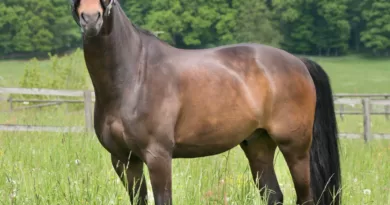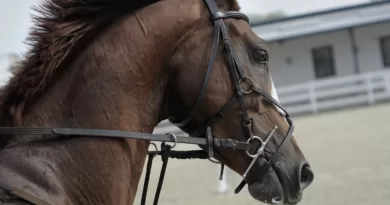How to Get Rid of a Horse’s Fat Pads
Understanding the Causes of Excess Weight in Horses
Understanding the causes of excess weight in horses is crucial for proper management and prevention of weight-related issues. One common reason for weight gain in horses is overfeeding, which can occur when owners mistakenly believe that providing more food means better health. Horses have evolved to efficiently digest and extract nutrients from forage, so overfeeding concentrates or providing too much grain can lead to weight gain. Additionally, access to lush pasture without proper monitoring and management can contribute to excess weight as horses consume more grass than necessary.
Inadequate exercise is another factor that can contribute to excess weight in horses. Horses that are not given the opportunity to move and engage in regular physical activity are more likely to accumulate extra pounds. This can happen in situations where horses are stabled for long periods without turnout or when their exercise routines are not varied or stimulating enough. Lack of exercise not only contributes to weight gain but can also lead to muscle loss and overall poor fitness.
Assessing Your Horse’s Body Condition Score
Assessing your horse’s body condition score is an important step in understanding their overall health and weight status. By evaluating their body condition, you can determine whether your horse is underweight, at an ideal weight, or carrying excess weight.
To assess your horse’s body condition score, you can start by visually evaluating their overall body shape and fat distribution. Look for signs of ribs, hip bones, and spine either sticking out prominently (indicating underweight) or obscured by excessive fat deposits (indicating obesity). Additionally, palpating areas such as the neck, shoulders, withers, ribs, and tailhead can provide insight into the amount of fat covering these areas. A subjective rating system, ranging from 1 (emaciated) to 9 (obese), is commonly used to categorize a horse’s body condition score. By regularly assessing your horse’s body condition, you can make informed decisions about their diet and exercise regimen to support their overall well-being.
Implementing a Balanced Diet for Weight Management
Feeding a balanced diet is crucial for managing an overweight horse. To begin, it’s important to evaluate and select appropriate forage options. Choose high-quality forage that is low in calories and sugar, such as mature grass hay. Limit access to lush pastures or consider using a grazing muzzle to restrict intake while still allowing your horse to enjoy turnout.
Next, focus on the type and amount of concentrates you provide. Opt for feeds with low energy and sugar content, specifically formulated for weight management. Be cautious with treats, as they can quickly add extra calories. Instead, consider offering healthy alternatives like carrots or apple slices in moderation.
Remember that every horse is unique, so feeding guidelines may vary. Monitor your horse’s body condition score regularly to determine if adjustments to the diet are necessary. Always consult with an equine nutritionist or veterinarian for expert guidance in tailoring a balanced diet suited to your horse’s specific needs.
Creating a Structured Exercise Routine for Your Horse
A structured exercise routine is crucial for maintaining and improving your horse’s overall health and well-being. Regular physical activity not only helps your horse burn calories, but it also builds muscle strength, improves cardiovascular fitness, and enhances mental stimulation. When creating an exercise routine for your horse, it is important to consider their age, fitness level, and any underlying health conditions.
Start by setting achievable goals and gradually increase the intensity and duration of exercise sessions. Begin with a combination of walking and trotting to warm up the muscles and prepare your horse for more strenuous activities. Incorporate a variety of exercises such as lunging, hill work, and pole exercises to engage different muscle groups and prevent boredom. Remember to incorporate regular rest days into your routine to allow your horse’s body to recover and avoid overworking. A structured exercise routine will not only help your horse maintain a healthy weight but also promote overall fitness and well-being.
Incorporating Regular Turnout and Pasture Grazing
Providing regular turnout and allowing horses to graze on pasture is essential for their overall health and weight management. Allowing horses access to pasture not only provides them with exercise but also gives them the opportunity to graze on grass, which is a natural part of their diet. Pasture grazing allows horses to consume fiber-rich forage, which aids in digestion and helps prevent overeating.
Regular turnout also helps with weight management by increasing a horse’s overall activity level. When horses have the freedom to move and explore their environment, they naturally burn calories and maintain muscle tone. Turnout also provides mental stimulation and helps prevent boredom, which can lead to undesirable behaviors such as cribbing or weaving. Additionally, being outside in a pasture allows horses to socialize with other horses, fulfilling their need for companionship.
Incorporating regular turnout and pasture grazing into your horse’s routine is important for maintaining a healthy weight. However, it’s essential to monitor your horse’s grazing time and ensure they are not overconsuming grass. Some horses have a tendency to graze excessively, which can lead to weight gain. Therefore, it’s important to implement controlled grazing and use pasture management techniques, such as strip grazing or using grazing muzzles, if necessary.
In conclusion, regular turnout and pasture grazing are vital for horses’ overall well-being and weight management. Allowing horses access to pasture not only provides them with natural forage but also promotes physical activity and mental stimulation. However, it’s important to monitor grazing time and use management techniques to prevent overconsumption and maintain a healthy weight for your horse.
Monitoring Feed Intake and Adjusting Portion Sizes
When it comes to managing a horse’s weight, monitoring feed intake and adjusting portion sizes is crucial. Careful observation of the amount and type of feed your horse consumes can help prevent overeating and promote weight loss. Start by measuring the amount of feed given at each meal and tracking it consistently. This will provide you with a baseline to work from and enable you to make adjustments as needed. Keep in mind that each horse is unique, so what works for one may not be suitable for another. Regularly assess your horse’s body condition score to determine if weight loss or maintenance is needed. If your horse is consistently gaining weight, it may be necessary to decrease the portion size or switch to a lower calorie feed. On the other hand, if your horse is losing weight too rapidly, increasing the portion size or considering a higher calorie feed might be necessary.
In addition to monitoring feed intake, it is essential to evaluate the quality of the feed being provided. Ensuring that your horse receives a balanced diet with the right amount of nutrients is key to their overall health and weight management. Consult with a veterinarian or equine nutritionist to determine the appropriate diet for your horse’s specific needs. They can help you identify any deficiencies or excesses in their current diet and create a plan to address them. Additionally, consider the timing of feedings. Dividing meals into smaller, more frequent portions can help prevent overeating and keep your horse satisfied throughout the day. By closely monitoring feed intake and adjusting portion sizes as necessary, you can help your horse achieve and maintain a healthy weight.
• Measure the amount of feed given at each meal and track it consistently
• Regularly assess your horse’s body condition score to determine if weight loss or maintenance is needed
• Decrease portion size or switch to a lower calorie feed if your horse is consistently gaining weight
• Increase portion size or consider a higher calorie feed if your horse is losing weight too rapidly
• Consult with a veterinarian or equine nutritionist to determine the appropriate diet for your horse’s specific needs
• Ensure that your horse receives a balanced diet with the right amount of nutrients
• Consider dividing meals into smaller, more frequent portions to prevent overeating
Identifying and Addressing Potential Health Issues
One of the key aspects of managing a horse’s weight is to identify and address any potential health issues that may be contributing to the problem. It is important to monitor your horse closely for any signs of discomfort, lameness, or changes in behavior, as these can be indicators of underlying health conditions. Common health issues that can affect a horse’s weight include dental problems, gastrointestinal issues, metabolic disorders, and hormonal imbalances.
Regular dental check-ups and floating can help ensure that your horse’s teeth are comfortable and able to properly chew and digest food. Gastrointestinal conditions, such as ulcers or parasites, can also impact a horse’s ability to maintain a healthy weight. It is important to work with your veterinarian to identify and treat these issues promptly. Additionally, metabolic disorders, such as equine metabolic syndrome or insulin resistance, can lead to weight gain or difficulty losing weight. Hormonal imbalances, such as an underactive thyroid, can also impact a horse’s metabolism and weight. Identifying and addressing these potential health issues is crucial for successful weight management and overall well-being of your horse.
Utilizing Supplements and Nutritional Strategies for Weight Loss
Supplements and nutritional strategies can play a significant role in aiding weight loss efforts in horses. However, it is crucial to approach their utilization with caution and seek guidance from a veterinarian or equine nutritionist. When it comes to supplements, there is a wide range of options available in the market, each claiming to have positive effects on weight loss. It is essential to research and select supplements that have been scientifically tested and proven to be safe and effective. Additionally, it is important to keep in mind that supplements should not be considered as a standalone solution for weight loss, but rather as a complementary component of a well-balanced diet and exercise regimen.
In addition to supplements, incorporating certain nutritional strategies can also support the weight loss journey for horses. One effective approach is ensuring the provision of a low-calorie diet that maintains appropriate nutrient levels for overall health and well-being. This can involve decreasing the calorie intake by limiting the amount of concentrated feeds and providing more forage-based options. Another strategy is to monitor the intake of sugars and starches, as excessive consumption of these can contribute to weight gain. Instead, focusing on providing a diet that is rich in high-quality proteins, vitamins, and minerals can help support weight loss efforts while meeting the horse’s nutritional requirements. Ultimately, a holistic approach that combines supplements and strategic nutritional choices can assist in achieving and maintaining a healthy weight for horses.
Seeking Professional Guidance from a Veterinarian or Equine Nutritionist
When it comes to managing your horse’s weight, seeking professional guidance from a veterinarian or equine nutritionist is essential. These professionals have the expertise and knowledge to help you navigate the intricacies of your horse’s diet and overall health. By consulting with a veterinarian or equine nutritionist, you can ensure that you are implementing the most effective strategies to achieve and maintain a healthy weight for your horse.
A veterinarian or equine nutritionist will be able to assess your horse’s individual needs and tailor a weight management plan specifically for them. They can provide valuable insights into your horse’s overall health, any underlying medical conditions, and the impact of various feeds and supplements on their weight. Additionally, they can advise you on proper portion sizes, feeding schedules, and the appropriate balance of nutrients that are necessary for your horse’s overall well-being. With their guidance, you can confidently make informed decisions about your horse’s diet and make adjustments as needed to achieve long-term weight management goals.
Tracking Progress and Maintaining a Healthy Weight for Your Horse
One of the most crucial aspects of managing your horse’s weight is closely monitoring their progress and making necessary adjustments to maintain a healthy weight. Regularly tracking your horse’s weight can provide valuable insights into their overall health and the effectiveness of your weight management strategies. There are several methods you can use to monitor your horse’s weight, such as a weight tape or digital scale, and it’s essential to establish a consistent schedule for weighing.
In addition to monitoring weight, regularly assessing your horse’s body condition score (BCS) can help you evaluate their overall body composition. BCS is a subjective scoring system that assesses the amount of fat present on different parts of the horse’s body. By visually and tactually assessing their ribs, tailhead, neck, and withers, you can assign a BCS value that indicates whether your horse is underweight, overweight, or at an ideal weight. Regularly assessing their BCS can help you identify any changes in their weight or body composition and make any necessary adjustments to their diet and exercise routine.
What are some common causes of excess weight in horses?
Some common causes of excess weight in horses include overfeeding, lack of exercise, grazing on lush pastures, genetic predisposition, and certain health conditions such as metabolic disorders.
How can I assess my horse’s body condition score?
You can assess your horse’s body condition score by evaluating factors such as the amount of fat cover, muscle tone, and overall body shape. This can be done by using a standardized scoring system, such as the Henneke Body Condition Scoring System.
How can I implement a balanced diet for weight management in my horse?
To implement a balanced diet for weight management in your horse, ensure that they are receiving the appropriate amount of forage and concentrate feed for their activity level. Limit access to high-calorie feeds and provide a diet rich in fiber from sources like hay or pasture.
How can I create a structured exercise routine for my horse?
Creating a structured exercise routine for your horse involves incorporating regular exercise sessions that include a combination of cardiovascular workouts, strength training, and mental stimulation. Consult with a professional trainer or equine exercise specialist for guidance.
Why is regular turnout and pasture grazing important for weight management?
Regular turnout and pasture grazing allow horses to engage in natural grazing behaviors and increase their overall activity level. This can help them burn calories and maintain a healthy weight.
How should I monitor my horse’s feed intake and adjust portion sizes?
Monitor your horse’s feed intake by measuring their feed accurately and tracking their weight regularly. Adjust portion sizes based on their body condition score, activity level, and any recommendations from a veterinarian or equine nutritionist.
What are some potential health issues that can contribute to weight gain in horses?
Some potential health issues that can contribute to weight gain in horses include metabolic disorders like insulin resistance, hormonal imbalances, and digestive issues. It is important to consult with a veterinarian to identify and address any underlying health problems.
Can supplements and nutritional strategies help with weight loss in horses?
Yes, supplements and nutritional strategies can be used to support weight loss in horses. This may include adding ingredients like chromium, omega-3 fatty acids, or herbal supplements that aid in metabolism and digestion. However, it is important to consult with a veterinarian or equine nutritionist before adding any supplements to your horse’s diet.
When should I seek professional guidance from a veterinarian or equine nutritionist?
It is recommended to seek professional guidance from a veterinarian or equine nutritionist if you are unsure about your horse’s weight management plan, if your horse has any underlying health issues, or if you are considering making significant changes to their diet or exercise routine.
How can I track progress and maintain a healthy weight for my horse?
You can track progress and maintain a healthy weight for your horse by regularly monitoring their body condition score, weight, and feed intake. Adjust their diet and exercise routine as needed, and consult with professionals if necessary. Regular veterinary check-ups and health assessments are also important for overall weight management.




